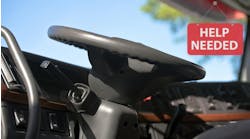Ron Echols is a "stringing driver," hauling pipe for fracking operations in West Virginia. He carries it all — 40, 60 and 80-foot pipe — while living out of a motel room in the mountains away from his Ohio home. The job can be stressful at times, even dangerous, but he has help to cope with day-to-day pressures: meditation.
"It sort of resets me," says Echols, who has been driving for 21 years, some of it over the road. "I find breathing meditation to be the simplest and most effective. I think there are benefits physically to it as well. If you concentrate on your breathing, you can't focus on anything else."
Echols doesn't know any other drivers who mediate, and he suggests that the majority of truckers think meditation is "wacky, kooky stuff." He adds that for the many drivers, meditation comes across as weakness or worse, for some, as an anti-Christian or Eastern-based religion in opposition to their own religious beliefs. "Mediation is just sitting still. If you tell people to sit still for a few minutes and just breathe, that's something that your mother or your grandmother said to do; sit still and breathe. That's mediation, but they didn't call it meditation. If we can explain to drivers, 'Look, we just want you to sit for a few minutes and breathe; clear your mind,' that's what the old folks used to say. That's what I like to do: clear my mind, turn everything off for a few minutes."
The benefits of meditation have been well researched and documented according to the National Institutes of Health (NIH). Research suggests that meditation may reduce blood pressure, symptoms of irritable bowel syndrome, anxiety, depression, insomnia and other maladies. It is safe and has no side effects. It's also free. About 8% of Americans meditate, according to NIH, but among truck drivers, the number is close to zero, according to meditating drivers.
Echols has been meditating for about 10 years and has seen the benefits. "I sleep better. When you meditate, it draws out some emotions. So the dreams do get vivid, but I rest better. I seem to be able to create a little bit of space for my emotions."
He adds: "I can get upset just like the next person. While I might want to get upset, meditation creates a buffer. That's why I think meditation is so important for truckers. It creates a buffer between them and road range and doing things that they shouldn't do. I can handle people better. Meditation just gives me that little extra buffer."
Linda Squire, who drove OTR for 13 years and retired last October from long haul to transporting special needs people in a minibus, meditates to relieve road stress. "When you’re out driving a semi, you just don’t dodge somebody as easy as I can in my minibus. You get the mindset that if other drivers are going to do something stupid, they’re going to hit you. If you swerve, you’re going to roll the truck over. It’s as simple as that, depending on the load; you can’t play dodge in a semi. You just hold your road and hope that they miss you. It scares the tar of out you. The next feeling is pure anger, because you nearly got seriously hurt or killed and of course that raises blood pressure. Through meditation, I was able to concentrate on the breathing part, taking deep breaths, calming myself down. If a situation was really bad, I’d look for a place to pull over and just sit there and relax and take deep breaths and get my thoughts going elsewhere."
She adds: "It brought my blood pressure down. I got rid of the anger and fear very quickly; before, I would just chew on it. I’d go for miles and miles and sometimes hours and think 'why did they do this' and 'don’t they know they could have killed me?' I found that when I did use meditation, I was able to focus away from the event that caused my stress and get relaxed quicker, let it go and move on. I really, truly was surprised how well it worked for me. It was very beneficial."
Driving a minibus has its own set of stresses, and Squire still mediates to help her cope.
Eden Kozlowski, who helps people understand the benefits of meditation, says that attracting drivers is a hard sell. She and her associates went through a list of about 200 carriers to whom they offered her services and for the most part no one bit. "I couldn't even get my foot in the door." She had limited success with one carrier when less than a handful of drivers attended a session and only one driver that she knew of continued: Linda Squire.
Frustrated, Kozlowski gave up trying to teach groups of drivers about meditation. "Every [industry or school] that I've been working in has been blossoming, but not trucking." She notes: "Many people that I have come in contact with are so open, so willing to try new things. But then there's the larger contingency that's like, 'Mmm, we're not going there.' Why? I have no idea."
Her approach to personalizing meditation is simple. "Focus on your breath. If you're a visual person, focus on a visual. If you want to say something over and over again in your head [a mantra] that's okay, too. I work with each person on whatever track works best for them."
Trucker Echols, who produced a YouTube video about meditation, thinks that more truckers would meditate if they understood what it really is. "This is just breathing. This is not religion. This is not mysticism. This is just sitting – something you do every day; just sitting and breathing. If you could explain it to drivers in that way, in that manner, I think that would really get them interested."




